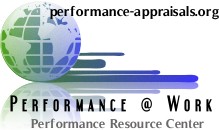Employees' Guide To Writing Self-Appraisals
Top : 4 Employees : Writing Self Appraisals
it's not new but more companies are asking employees to assess their OWN performance -- i.e. to write their own self-appraisals, rather than to have the manager do it. That can be a good thing, since it's more involving of employees and likely to be more engaging if done correctly.
Employees Need Some Guidelines For Writing Self-Appraisals
Unfortunately, very few managers and companies are actually training employees on how to complete the self assessment process so that it is meaningful and useful to both manager and employee. For most, when presented with the task, there's a sense of confusion and loss, at least for the first few times.
To make it even more difficult, what "works" in writing these self-assessments can vary from manager to manager.
Tips and Help For Employees On Completing Self-Assessment Forms
|
Learn To Maximize The Value Of Your Performance Review Written Specifically For Employees!. Performance appraisals work best when employees understand the process, prepare, and see the benefits of being engaged in it. Getting The Most From Performance Appraisals For Employees is meant to get employees ready. In this quick "LearnByte" you'll learn how to prepare for your review meeting, how to handle disagreements, what questions to ask and much more. What's Most Important Reviews, fairly or unfairly can impact on your career progress, pay, and how you are perceived. Do NOT become a passive player or victim. Click here for more information about Getting The Most From Performance Appraisals For Employees (Sale Price: $7.95) |
We've gathered together some articles and references to help you complete these tasks, but more importantly to do so in a way that is most likely to be USEFUL to you, and to help enhance your career, and enjoyment of the job.
Before you look at those, here are some tips and suggestions:
Don't see the task as completing the form. You have some responsibiity for being an active player in this process, so try to identify how this process can help YOU be a better employee, and how to use the assessment to get what you want at work. It's not about getting it done. It's about making it useful.
Ask What The Manager Expects: Too often employees are hesitant to ask for clarification about what the manager expects from the self-appraisal. You can't read minds. Ask questions. Get clarification about how the assessment will be used, and what the conversation will be like. Or any other details.
Handling Disagreements: Because the assessment process is so flawed, and subject to bias and having different perspectives, expect disagreements when discussing your self-evaluation. It's normal. Don't take things personally, but try to get something from differing perspectives even if your manager disagrees with your self-appraisal. Accept that people have different experiences, different opportuniites to see you work, and start from there. Expect disagreement, and remind yourself to stay calm, and reason out your position beforehand.
Add To Forms As Necessary: Most appraisal forms are terrible, and limiting. To make the experience useful as a basis for discussion, feel free to add extra information to any form you are asked to fill out, even to the point of adding a sheet with your own comments or details to "flesh out" the evaluations. Again, it's up to you to inform your manager and HR, and to present logical arguments, and examples, even if there's no "space" on the form.
Don't Whitewash Flaws, Or Over Sell Accomplishments - Be Balanced: You'll have a tendency to try to downplay mistakes and flaws in your performance, and over sell your accomplishments. We all do. However, you are far better trying to present a somewhat balanced view of yourself, your capabilities, and yes, your errors and mistakes. This increases your credibility, and can be a huge part of creating a perception that you are a strong, reasonable, and realistic employee.
More References And Guides To Employee Self-Assessment
By Halogen - A good question, and here's an attempt to answer it, but there's more in terms of getting employees to understand the context of self-evaluations and how to manage them. Viewed 316 Times )
By Diane Lynn - Of course, you can just fill out your self-appraisal form each year, but here's some strategies to apply to set the right tone. Viewed 495 Times )
By Bernhard Erich Reichert - Abstract Only: This study examines whether eliciting self-evaluations from employees in a compensation setting context leads to higher or lower employer welfare when employees are not aware of their marginal contribution to firm welfare. Contrary to this position I propose that providing employees a voice in the compensation setting process when employees are not aware of their marginal contribution to firm welfare has the unintended effect of leading to less employee satisfaction with compensation, which results in lower employer welfare. Such an effect is due to self-evaluations leading to greater employee overconfidence in their performance resulting from a motivated reasoning process. I present experimental evidence from comparing a control condition without self-evaluations to three different self-evaluation reporting conditions, finding evidence consistent with the premise that self-evaluations lead to lower employer welfare. Viewed 270 Times )
By Chad Brooks - Great suggestions on how to write your self evaluation to send just the right message to your boss and HR. It's a little about spinning what you have to say. Viewed 415 Times )
By na - A brief look at whether this common practice -- employee self-appraisals, actually is useful. No definitive answer, because like all appraisal methods, it depends how it's done, and who is involved. Viewed 277 Times )
By Malcolm Fleschner - Simple: Own your faults, self-praise with specifics, and help direct the dialogue with your inputs. Easy peasy. Viewed 361 Times )
By Rich Hein - Some good suggestions on how employees can approach the situation to make doing their own self-evaluations useful for themselves, since it shouldn't be just about getting it done. Learn how to benefit. Viewed 349 Times )
By Amy Gallo - One of the better articles on the topic, because it stresses that employees need to be active participants, and learn as much as possible about what the evaluations will be used for. Good tips, and some examples. Start here. Viewed 415 Times )
By Melany Gallant - Stuck about what to write in your self-appraisal? Here are some examples, but as the title says, use them as ways to inspire and give you ideas, rather than copying them. Viewed 437 Times )
By Dominique Jones - Six basic steps to apply if you are asked to write a self appraisal. Simple, but the most useful are: Don't try to do it all in one sitting, and, share what you've learned over the last year. Good advice. Viewed 370 Times )
By Northern Arizona University - Six short but useful guidelines for writing your self-assessment. From The University of Northern Arizona to help staff complete the task. Viewed 293 Times )
By HRViNet - Actually a template for questions to include in a self-appraisal form, but included here because it's a great way to get ideas about what to include in YOUR answers, OR to add things that are not asked on the form. Viewed 308 Times )
|
Library Home Page |
Pages Updated On:
6-Sep-2016
-
15:26:57
We can help you with the various parts of a performance management system with our miniguides on each component.
Instantly downloadable and built to save you time.
There's even help for employees on how to navigate the process.


